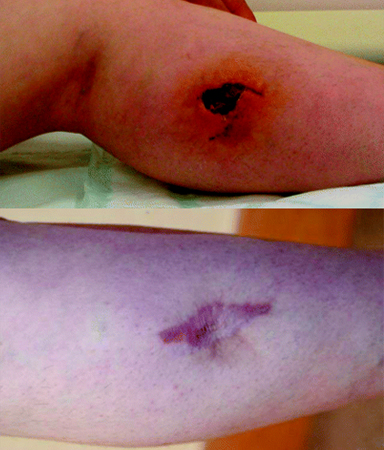Summary
Definition
History and exam
Key diagnostic factors
- circumstances of animal bite
- wound description
- erythema
- induration
- fluctuance
- purulent drainage
- regional adenopathy
- necrotic tissue
- vital signs unstable
Risk factors
- age <14 years
- pet ownership
- high-risk groups (for rabies infection)
- previous medical procedures (increased risk of infection if bitten)
- underlying medical conditions (increased risk of infection if bitten)
Diagnostic tests
1st tests to order
- wound cultures
- x-ray
Tests to consider
- CBC
- blood cultures
- angiography
- photography
- DNA swab
Treatment algorithm
uninfected wounds
uncomplicated infected bite: not penicillin-allergic
uncomplicated infected bite: penicillin-allergic
complicated bites: not penicillin-allergic
complicated bites: penicillin-allergic
Contributors
Authors
Oliver Spencer, MBBS, BSc, MRCS, FRCEM
Consultant, Emergency Medicine
Croydon University Hospital NHS Trust
London
UK
Disclosures
OS declares that he has no competing interests.
Subhro Banerjee, MBBS, FRCEM
Consultant, Emergency Medicine
Croydon University Hospital
London
UK
Disclosures
SB has no competing interests.
Acknowledgements
Dr Oliver Spencer and Dr Subhro Banerjee would like to gratefully acknowledge Dr A. Parfitt, Dr Randy Taplitz, and Dr Eric Chang, the previous contributors to this topic. AP and EC declare that they have no competing interests. RT has received funding from Pfizer to attend several antifungal symposia and funding from Schering-Plough to attend an antifungal Speaker's Bureau Workshop.
Peer reviewers
Cynthia Christy, MD
Associate Chief of Pediatrics
General Pediatrics/Pediatric Infectious Diseases
University of Rochester
New York
NY
Disclosures
CC declares that she has no competing interests.
Gregory Conners, MD, MPH, MBA, FAAP, FACEP
Interim Chair of Emergency Medicine
Professor of Emergency Medicine and Pediatrics
University of Rochester
New York
NY
Disclosures
GC declares that he has no competing interests.
Jeffrey R. Suchard, MD, FACEP, FACMT
Professor of Clinical Emergency Medicine
Director of Medical Toxicology
Department of Emergency Medicine
University of California
Irvine Medical Center
Orange
CA
Disclosures
JRS declares that he has no competing interests.
Peer reviewer acknowledgements
BMJ Best Practice topics are updated on a rolling basis in line with developments in evidence and guidance. The peer reviewers listed here have reviewed the content at least once during the history of the topic.
Disclosures
Peer reviewer affiliations and disclosures pertain to the time of the review.
References
Key articles
Rao AK, Briggs D, Moore SM, et al. Use of a modified preexposure prophylaxis vaccination schedule to prevent human rabies: recommendations of the Advisory Committee on Immunization Practices - United States, 2022. MMWR Morb Mortal Wkly Rep. 2022 May 6;71(18):619-27.Full text Abstract
Stevens DL, Bisno AL, Chambers HF, et al. Practice guidelines for the diagnosis and management of skin and soft tissue infections: 2014 update by the Infectious Diseases Society of America. Clin Infect Dis. 2014 Jul 15;59(2):e10-52.Full text Abstract
National Institute for Health and Care Excellence. Human and animal bites: antimicrobial prescribing. November 2020 [internet publication].Full text
Centers for Disease Control and Prevention. Advisory Committee on Immunization Practices recommended immunization schedule for adults ages 19 years or older, United States, 2025. Nov 2024 [internet publication].Full text
Centers for Disease Control and Prevention. Advisory Committee on Immunization Practices recommended immunization schedule for children and adolescents ages 18 years or younger, United States, 2025. Nov 2024 [internet publication].Full text
Reference articles
A full list of sources referenced in this topic is available to users with access to all of BMJ Best Practice.

Differentials
- Soft tissue injury
More DifferentialsGuidelines
- Recommended immunization schedule for adults aged 19 years or older
- Recommended immunization schedule for children and adolescents 18 years or younger
More GuidelinesLog in or subscribe to access all of BMJ Best Practice
Use of this content is subject to our disclaimer